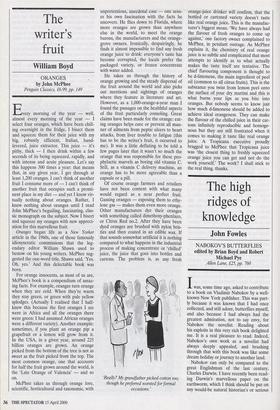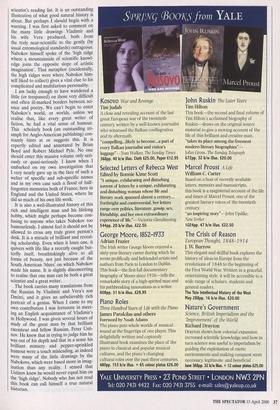The high ridges of knowledge
John Fowles
NABOKOV'S BU ITERFLIES edited by Brian Boyd and Robert Michael Pye Allen Lane, £25, pp. 760 Iwas, some time ago, asked to contribute to a book on Vladimir Nabokov by a well- known New York publisher. This was part- ly because it was known that I had once collected, and still adore, butterflies myself, and also because I had always had the greatest admiration, not to say envy, for Nabokov the novelist. Reading about his exploits in this very rich book delighted me. It is a real pleasure to read. Indeed, Nabokov's own work as a novelist had always deeply appealed, and brushing through that with this book was like some dream holiday or journey to another land.
Nabokov can only be compared to the great Englishman of the last century, Charles Darwin. I have recently been read- ing Darwin's marvellous paper on the earthworm, which I think should be put on any would-be natural historian's or serious scientist's reading list. It is an outstanding illustration of what good natural history is about. But perhaps I should begin with a warning. I was first asked to comment on the many little drawings Vladimir and his wife Vera produced, both from the truly near-scientific to the gently (by usual entomological standards) outrageous. Nabokov himself spoke of the 'high ridge where a mountainside of scientific knowl- edge joins the opposite slope of artistic imagination'. That metaphor (incidentally, the high ridges were where Nabokov him- self liked to collect) gives a vital clue to his complicated and multifarious personality. I am lucky enough to have wandered a little (or trespassed) on those very difficult and often ill-marked borders between sci- ence and poetry. We can't begin to enter Nabokov's world, or worlds, unless we realise that, like every great writer of fiction, he had a vital sense of humour. This scholarly book (an outstanding tri- umph for Anglo-American publishing) con- stantly hints at or suggests this. It is expertly edited and annotated by Brian Boyd and Robert Michael Pyle. No one should enter this massive volume only seri- ously or quasi-seriously. I know when I embarked on my own investigation that I very nearly gave up in the face of such a welter of specific and sub-specific names and in my own case such a flood of half- forgotten memories both of France, here in England and the United States, where he did so much of his own life work.
It is also a well-illustrated history of this rich and intelligent man and his lifelong hobby, which might perhaps become con- fusing to anyone who takes Nabokov too humourlessly. I almost feel it should not be allowed to cross any truly grave person's desk. It is a miracle of brilliant and reveal- ing scholarship. Even when it loses one, it quivers with life like a recently caught but- terfly itself, breathtakingly alive to all forms of beauty, not just because of the South American 'blues' on which Nabokov made his name. It is slightly disconcerting to realise that one man can be both a great scientist and a great writer. The book carries many translations from the Russian by Vladimir and Vera's son Dmitri, and it gives an unbelievably rich portrait of a genius. When I came to my own contribution I was fortunate in meet- ing an English acquaintance of Vladimir's in Hollywood. I was given several hours of study of the great man by that brilliant raconteur and fellow Russian, Peter Usti- nov. He knew that in trying to judge him he was out of his depth and that in a sense his brilliant mimicry and pepper-sprinkled humour were a touch misleading, as indeed were many of the little drawings by the Nabokovs, which were based more in imag- ination than any reality. I sensed that Ustinov knew he would never equal him on the 'high ridge'. Nobody who has not read this book can call himself a true natural historian.



































































 Previous page
Previous page